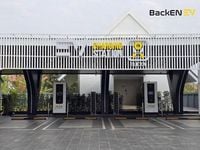The electric vehicle market in Thailand is witnessing a significant surge, driven by fierce competition among automakers and government initiatives aimed at promoting electric vehicle (EV) adoption. The "30@30" policy is a key aspect of this initiative, designed to prepare the nation for a low-carbon society. This policy, coupled with the drastically lower charging costs compared to traditional fuel, has led to a remarkable 76% increase in electric vehicle registrations in 2024, totaling 67,259 new vehicles. As of March 26, 2025, the total number of registered electric vehicles in Thailand stands at 156,129.
As the electric vehicle market continues to grow, it signals a ripe opportunity for entrepreneurs to invest in electric vehicle charging stations, which are currently insufficient to meet demand. The Electricity Generating Authority of Thailand (EGAT) is at the forefront of this development, working on the "EleX by EGAT" project to enhance the infrastructure for electric vehicle charging. This initiative includes the launch of the "EleXA" application, which aims to support the electric vehicle ecosystem in the country.
EGAT is also developing the "BackEN EV" system, a comprehensive management tool designed to help entrepreneurs efficiently manage their charging stations. This system will facilitate better oversight and operational efficiency, promoting further investment in charging infrastructure. On April 21, 2025, EGAT will host the "EGAT EV: Charge Up Your Business" event, aimed at providing business insights, technological knowledge, and collaboration opportunities for potential investors in the charging station market.
According to Pichit Pongprasert, Head of Electric Vehicle Solutions at EGAT, the EleX charging stations have expanded from a mere five locations at PT gas stations to a robust network of 300 stations across the country. This includes 200 stations under the EleX brand and an additional 100 stations funded directly by EGAT. The growth of this network is vital in building consumer confidence in electric vehicle usage.
The BackEN EV system is designed to cater specifically to commercial charging station operators, allowing real-time monitoring and management of charging operations. Users can find and access charging stations through the EleXA application, which supports various brands of electric vehicle chargers simultaneously. This year, EGAT plans to target business operators involved in solar energy and electric vehicle systems to expand the market further.
Pichit notes that the technology behind electric vehicle chargers has significantly improved, with initial chargers rated at 120 kilowatts now reaching 600-700 kilowatts. This advancement, along with decreasing charger prices, presents a favorable investment climate for entrepreneurs looking to enter the electric vehicle charging market.
Moreover, EGAT is set to launch the EGAT Academy, aimed at enhancing the skills of professionals in the charging station business. This initiative will collaborate with vocational institutions to issue certifications in electric vehicle service and maintenance, thereby raising safety and reliability standards within the electric vehicle ecosystem.
On the entrepreneurial side, Thaweewat Chusings, Managing Director of Six Plus One Co., Ltd., which imports Delta brand chargers and utilizes the BackEN EV management system, shared insights from his two years in the electric vehicle business. He observed a steady increase in installation demand and anticipates a doubling of sales compared to the previous year as more Thai consumers opt for electric vehicles.
Thaweewat has integrated charging stations into his hotel and café services, particularly in areas with high customer traffic. He emphasizes the reliability of the BackEN EV system and the EleXA application, which have never malfunctioned, ensuring a seamless experience for users. This reliability is crucial, especially in light of reports from social media highlighting issues with other systems.
For those interested in entering the electric vehicle charging station business, EGAT provides free consultations through its EGAT EV Business Solutions team. Interested parties can also stay updated via their Facebook page, website, and Line OA.
Meanwhile, in the real estate sector, the demand for pet-friendly condominiums is on the rise, particularly in prime locations near public transportation. AL Dubaili ESU has identified a strong market for condominiums priced between 3-5 million baht, especially in areas like Ratchayothin-Bang Sue, Ratchada-Phra Ram 9, and Phra Khanong-On Nut.
According to Mr. Prawanchai Rakchaiworrasut, Director of AL Dubaili ESU, a recent survey conducted in January revealed that 75% of respondents expressed interest in purchasing pet-friendly properties. The survey included 183 participants, predominantly women (58%), with 35% male and 7% identifying as LGBTQ+, aged between 29 and 44 years.
The survey also highlighted that 58% of respondents had monthly incomes ranging from 25,000 to 75,000 baht, while 18% earned over 75,000 baht. This demographic represents a significant purchasing power, particularly among singles who make up 67% of those interested in pet-friendly properties.
Locations that have garnered interest include Ratchayothin-Jatujak-Bang Sue, Ratchada-Phra Ram 9, and Phra Khanong-On Nut, all of which offer convenient access to workplaces and essential services for pet owners, such as veterinary clinics and grooming services. The increasing trend of pet ownership, especially among the younger generation, has prompted developers to consider creating pet-friendly living spaces to cater to this emerging market.
According to a 2023 survey by Srinakharinwirot University, 49% of "Gen Y" respondents view pet-friendly accommodations as crucial in their housing decisions. This trend underscores the evolving preferences of property buyers and presents a unique opportunity for developers to differentiate their offerings in a competitive market.
Mr. Prawanchai emphasizes the importance of adapting to these changing consumer behaviors, noting that properties allowing pets can command rental prices 10-15% higher than standard units. This trend reflects the willingness of buyers to invest in properties that cater to their lifestyle choices.
As Thailand's economy continues to navigate challenges, including rising household debt, the real estate sector must innovate to meet the demands of discerning buyers. The focus on pet-friendly developments is a prime example of how market dynamics are shifting, driven by consumer preferences and the need for unique offerings in a competitive landscape.






